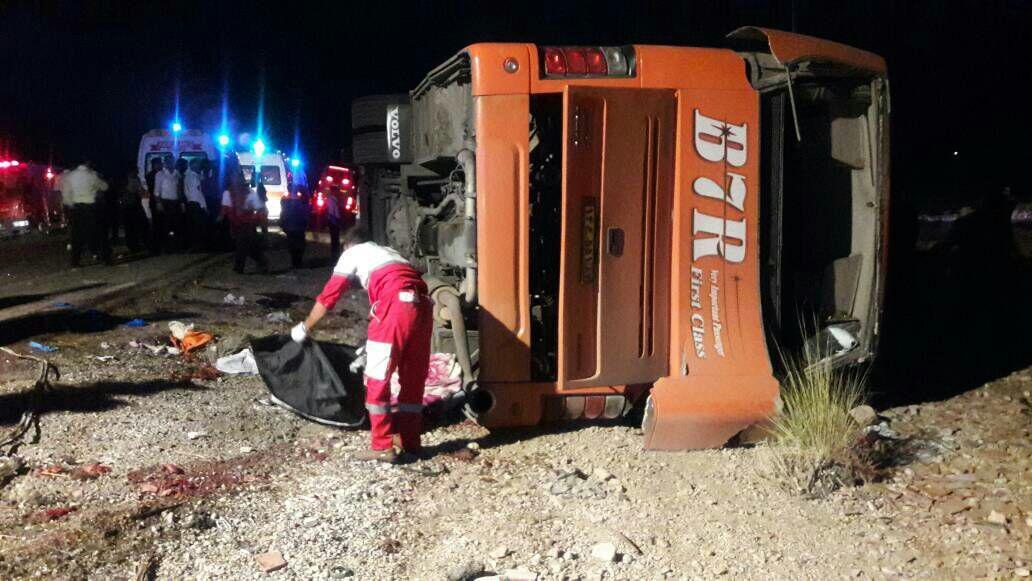A catastrophic bus accident in southern Iran has claimed the lives of at least 21 people, according to state media reports.
Local media sources report that the incident occurred on Saturday close to the city of Shiraz, the administrative center of Fars province, a locale known for its cultural heritage and significant population.
Alongside the fatalities, 34 individuals sustained injuries of varying severity in the upheaval, which emergency officials continue to address.
Masoud Abed, the head of the emergency services for Fars province, confirmed the ongoing rescue operations as authorities strive to offer aid to those injured.
He also stressed that official casualty figures and a more comprehensive account of the incident will be made available once rescue teams have completed their tasks and the investigative process into the accident’s cause has been concluded.
The precise factors contributing to the bus overturn remain unclear.
On the other hand, authorities have launched a full inquiry to determine why the vehicle lost control, whether human error, mechanical failure, or unsafe road conditions played a role.
Initial reports have not assigned definitive blame, reflecting the complexity often inherent in Iran’s frequent traffic accidents.
This tragedy underscores a broader issue that has long plagued Iran’s road safety landscape.
The nation experiences an alarmingly high volume of road traffic fatalities, with approximately 17,000 deaths reported annually.
This figure places Iran among the countries worldwide with the highest rates of casualties resulting from road and street accidents.
Such statistics paint a grim picture of traffic safety in the country, highlighting systemic challenges that contribute to the loss of life on Iran’s roads.
Experts and safety officials attribute these distressing numbers to multiple interconnected factors.
A significant concern is the often lax enforcement of traffic laws and safety regulations.
Despite legislative efforts, adherence to basic precautions such as seatbelt use, speed limits, and restrictions on hazardous driving behavior remains inconsistent.
This enforcement gap enables risky driving practices to proliferate, leading to frequent accidents and severe injuries.
Another notable factor exacerbating the danger on Iranian roads is the widespread usage of aged and poorly maintained vehicles.
Many vehicles in circulation date back years, if not decades, and lack modern safety technologies that can prevent or reduce the severity of collisions.
These older vehicles are prone to mechanical faults and failures, especially under the stress of long-distance travel across regions that sometimes offer challenging terrain and suboptimal road conditions.
Additionally, Iran’s emergency response infrastructure has struggled to keep pace with the scale and frequency of accidents.
Emergency medical services, including rapid ambulance deployment and trauma care facilities, are essential in mitigating fatalities following crashes.
However, limitations in resources, equipment, and trained personnel often hinder timely and effective response, reducing the chances of survival for seriously injured victims.
Road safety in Iran has been a subject of extensive policy debate and public concern.
In recent years, officials have embarked on campaigns promoting safer driving behaviors, increased traffic surveillance, and upgrading transportation infrastructure.
Efforts have also been made to modernize vehicle fleets by encouraging the adoption of newer models with advanced safety features.
However, progress has been uneven, and high fatality rates persist.
The government’s challenge is compounded by socioeconomic factors that influence driver behavior and vehicle ownership.
Rising costs can drive many to purchase older, cheaper vehicles that do not meet safety standards.
On the other hand, road users face the pressures of long commutes or tight schedules that may encourage hurried or reckless driving.
Furthermore, the availability and quality of road infrastructure, including signage, lighting, and maintenance, vary across provinces, adding inconsistencies to the conditions drivers face.
The recent fatal bus accident near Shiraz serves as a stark reminder of these vulnerabilities within the national transportation system.
It highlights the urgent need for comprehensive reforms aimed at improving safety and preventing loss of life on Iranian roads.
Such reforms might include:
- stricter enforcement of driving laws,
- investment in road and vehicle safety technology,
- enhanced training for drivers and emergency responders, and,
- public awareness campaigns designed to shift driving culture towards greater caution and responsibility.
As rescue teams continue their work in Fars province, families of the victims and the wider Iranian public await further details about the incident and its aftermath.
The tragedy rekindles calls from civil society and advocacy groups for a sustained commitment to prioritizing road safety at all levels, from policymakers to ordinary drivers.
In conclusion, the overturning of the bus near Shiraz, resulting in over twenty deaths and dozens of injuries, is a deeply saddening event that reflects broader endemic challenges in Iran’s road safety framework.
Addressing these issues is paramount to preventing similar future losses and protecting the lives of all road users across the country.







